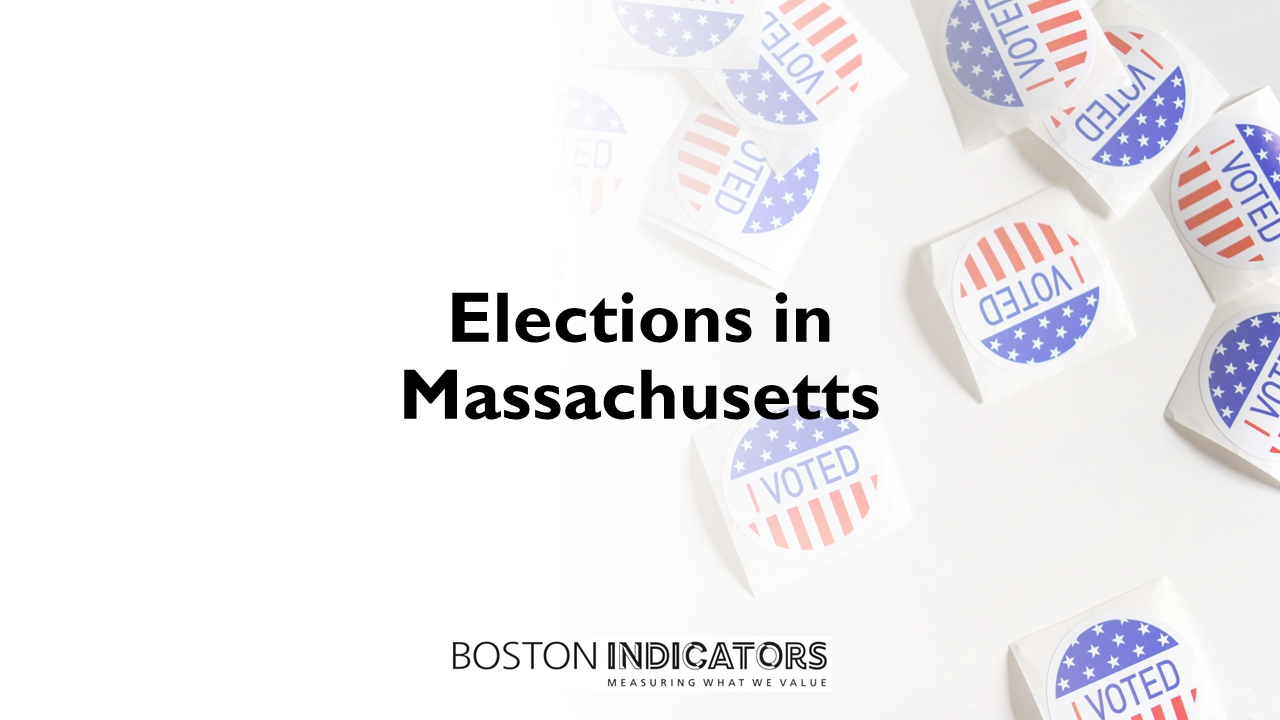Dialogues on Voter Engagement
October 18, 2022
With the 2022 midterm elections just three weeks away, the Boston Foundation held its first in what will be a series of nonpartisan forums on voter engagement on October 18. Boston Foundation President and CEO Lee Pelton and Communications and Public Affairs Officer Julia Howard opened the event with some words on the Boston Foundation’s engagement efforts, which include the launch of a new voter awareness and engagement initiative, using Democracy Works’ TurboVote platform to help people register to vote, check their registration status, sign up for election alerts, and make their plan to vote.
The need for engagement efforts were made clear a few minutes later as Peter Ciurczak of Boston Indicators shared a data presentation that demonstrated just where we as a state fall short in voter engagement, particularly among non-White voters, whose turnout rates lag White turnout by large amounts. The result, in part, is a legislature that is older, whiter and more male than the state as a whole.
In the discussion that followed, panelists shared both their concerns over the causes of voter apathy or inaction, and some ideas that are helping to both drive higher voter registration and improved turnout in Massachusetts at a time when other states are using dubious means to make voting more difficult.
Panelists Beth Huang of Massachusetts Voter Table, Adam Hinds of the Edward M. Kennedy Institute for the United States Senate, and political consultant Wilnelia Rivera highlighted the critical need for building trust as a precursor for engagement, as moderators Julia Howard and Vetto Casado of TBF asked them to share what works in creating more empowered and active citizens.
The need for engagement efforts were made clear a few minutes later as Peter Ciurczak of Boston Indicators shared a data presentation that demonstrated just where we as a state fall short in voter engagement, particularly among non-White voters, whose turnout rates lag White turnout by large amounts. The result, in part, is a legislature that is older, whiter and more male than the state as a whole.
In the discussion that followed, panelists shared both their concerns over the causes of voter apathy or inaction, and some ideas that are helping to both drive higher voter registration and improved turnout in Massachusetts at a time when other states are using dubious means to make voting more difficult.
Panelists Beth Huang of Massachusetts Voter Table, Adam Hinds of the Edward M. Kennedy Institute for the United States Senate, and political consultant Wilnelia Rivera highlighted the critical need for building trust as a precursor for engagement, as moderators Julia Howard and Vetto Casado of TBF asked them to share what works in creating more empowered and active citizens.
Rivera and Huang, in particular, highlighted a number of community-based interest groups that are helping to increase political awareness, making key issues more visible and speaking more directly to people’s concerns.
They also noted the potential energy of a new generation of young voters, who care deeply about issues but who have not been engaged in the voting process. A lack of competitive races, too, reduces the level of engagement between candidates and voters.
All the panelists agreed that limiting the concept of ‘engagement’ to voting alone would not lead to change. “Voting is a two-times-a-year thing, but the ability to change things happens year-round,” said Huang. Hinds noted that voting reforms, such as mail-in voting and early voting have expanded the electorate, increasing turnout in recent years, but that additional work was needed to create deeper year-round engagement. Rivera agreed. “So much it that people feel disconnected,” she said. “We have missed that human connection with each other.”
But all three listed vehicles for continuing civic engagement, whether through getting involved with resident councils, parent groups, youth programs, and other forums for highlighting problems and crafting solutions.
The resulting work not only addresses immediate concerns, it helps to create a new generation of civically engaged community leaders.
They also noted the potential energy of a new generation of young voters, who care deeply about issues but who have not been engaged in the voting process. A lack of competitive races, too, reduces the level of engagement between candidates and voters.
All the panelists agreed that limiting the concept of ‘engagement’ to voting alone would not lead to change. “Voting is a two-times-a-year thing, but the ability to change things happens year-round,” said Huang. Hinds noted that voting reforms, such as mail-in voting and early voting have expanded the electorate, increasing turnout in recent years, but that additional work was needed to create deeper year-round engagement. Rivera agreed. “So much it that people feel disconnected,” she said. “We have missed that human connection with each other.”
But all three listed vehicles for continuing civic engagement, whether through getting involved with resident councils, parent groups, youth programs, and other forums for highlighting problems and crafting solutions.
The resulting work not only addresses immediate concerns, it helps to create a new generation of civically engaged community leaders.

